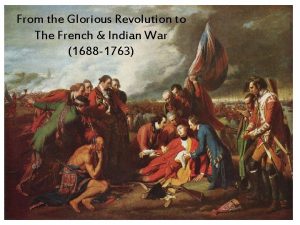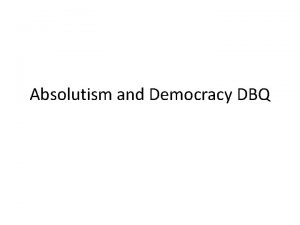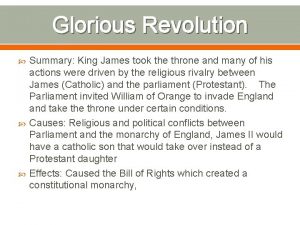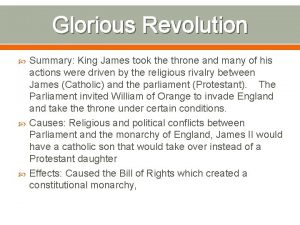Glorious Revolution Glorious Revolution King James II of






- Slides: 6

Glorious Revolution

Glorious Revolution • King James II of England came to power in England in 1685 and quarreled with Parliament—the governing body that represented the people of England—almost constantly during his reign. There were several reasons for these quarrels. For one, James was Catholic, and England had been a Protestant nation for over a century. For another, James believed that the king, not Parliament, was the ultimate authority in government. Members of Parliament disagreed.

Glorious Revolution • A group of English nobles invited the Dutch leader, William of Orange, to invade England. In their invitation, they informed William that most of the kingdom's people wanted a change. The invitation put William and his wife Mary, the daughter of James II, in a difficult position. It would be appalling for Mary to rise up against her father.

Glorious Revolution • When William sent his troops to England they did not have to fight. All of King James II’s troops surrendered because they too wanted change. • With almost no bloodshed, England had undergone a "Glorious Revolution. " The issue was not if there would be a monarchy but who would be monarch. William and Mary were offered to be king and queen of England they accepted. William and Mary also accepted the English Bill of Rights.

Glorious Revolution • The Glorious Revolution led to the English Bill of Rights. Written by members of Parliament and signed by William and Mary in 1689, the Bill of Rights had several parts. It listed what Parliament believed to be James’s crimes while king. It also established that although kings and queens had power, Parliament had more. Henceforth, all kings and queens would need to recognize Parliament as the final authority in English government and making laws. The kings and queens were limited by a constitution that told them what they could and could not do.

Glorious Revolution • The Bill of Rights also safeguarded the rights of English citizens from the powers of government, whether kings or Parliament. For instance, the Bill of Rights allowed people to be tried by a jury chosen from other citizens, and stated that people could not be subjected to cruel punishments. Many of these ideas appeared less than a century later in the U. S. Constitution.











